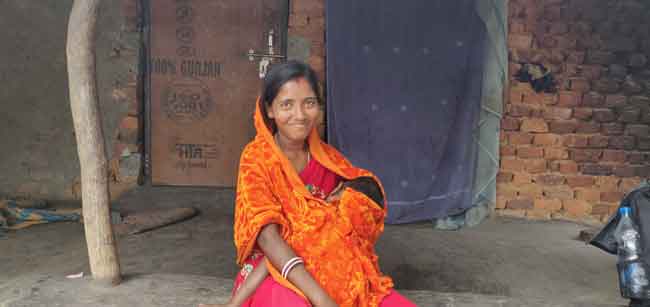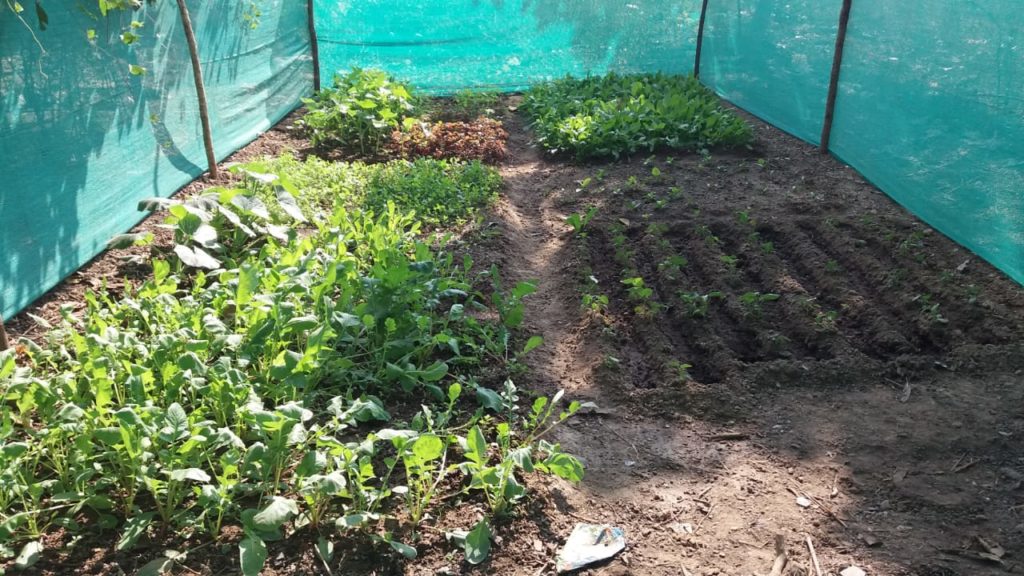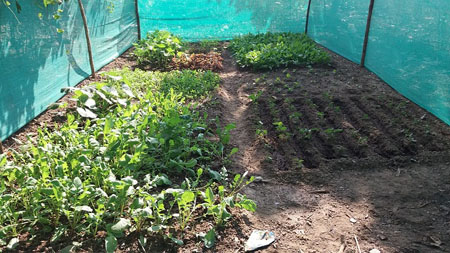20-year old Ambika Gope lives in Bagalgora village in Ghatshila block of Jharkhand with her husband. Shy and reserved, Ambika is also a mother of two – 53 months old daughter Sombari, and Rahul – her 44 months old son. Being married and becoming a mother at such a young age surely pushed Ambika and her children into the intergenerational cycle of malnutrition. In such cases, parent’s especially mother’s health and nutritional status plays a crucial role in the health of their future generations. If not broken at an early age, this vicious cycle can lead to serious health issues and lack of physical and cognitive development in children.

Ambika Gope of Bagalgora village, East Singbhum district talks to us while her son Rahul is fast asleep.
Background
Ambika’s family is one of many families who gets engulfed into the cycle of intergenerational malnutrition due to various socio-economic reasons. Some of the most common factors include poor economic background and lack of education and awareness. Early marriage is also a crucial factor leading to such cycle of malnutrition especially within the Santhali community which Ambika belong to.
Ambika’s daily routine includes looking after her children and doing household chores. Her husband is a daily wage labourer with a tent house decorator in the nearby town of Galudih. They also own a small piece of land where they follow monocropping of paddy.
Beginning of intergeneration malnutrition cycle
Ambika got married at a very early age, even before attaining her 15th birthday. And immediately after marriage she conceived and gave birth to her first child – daughter Sombari. Her body underwent tremendous pressure due to which she became weak and faced lactation failure. Sombari could not be breastfed and was therefore deprived of colostrum milk which contains antibodies and protein, and, protects the baby from viruses and strengthens immunity. She was dependent on outside milk and owing to their poor economic condition, Sombari’s nourishment was insufficient since her birth. Although both the mother and child were receiving insufficient nourishment, they were hardly aware of their condition. It was only three years back when Sombari’s condition deteriorated that she had to be admitted to the Malnutrition Treatment Centre (MTC). She stayed there for a month, but as Ambika shared, “Food provided in MTC did not suit my daughter as we could not see any improvement. So, we decided to bring her home and followed our routine feeding practices.”
Not long after this incident, Ambika conceived her second child. She gave birth to her son Rahul who is now 44 months. And not surprisingly, he also fell into the malnutrition cycle. During a child screening drive undertaken by Welthungerhilfe’s partner Center for World Solidarity (CWS) in December 2018, Ambika’s children were found to be in the severely malnourished category. Somari weighed only 10.1 kg and Rahul 8.1 kg. Both her children being detected malnourished surely worried Ambika.
Nutrition camp and impact
Ambika was advised and counseled by CWS to take part in the 15 days nutrition camp organized under the project in the local Anganwadi centers. Known as the ‘Positive Deviance/Nutrition camp”, Ambika joined the camp with a hope to revive the health of her children. She attended the camp for all 15 days which was organised between 5th -19th December 2018. Ambika learned about a lot of issues that were previously unknown to her. She was advised and taught on correct feeding and child care practices, including the importance of following a healthy and diverse diet.
Being part of the camp, Ambika could link the learnings to her previous conditions. Her active participation helped her bring positive changes in the children’s growth. Although Sombari and Rahul are still in the red category, they are slowly and steadily improving and gaining weight.
“Initially, I was apprehensive to attend the camp since I thought it might not be very helpful. It was only when bhaiya (CSW project staff) assured me that my children’s health will improve by me attending the camp, I said yes. I got to know about so many aspects of food and cleanliness, and how it directly affects our health. They also helped me in setting up my own small nutrition garden. I am very fond of my garden and regularly consume fresh leafy vegetables. It is especially helpful for my children”, shared Ambika.
The project team closely monitors Sombari and Rahul. Since they are out of the critical 1000 days loop it poses a serious challenge in bringing about a balanced development in them. Despite the special care, Sombari and Rahul’s growth has been slow. By end of the nutrition camp, Sombari weighed 10.3 kg, only 200 gm growth in 15 days, and Rahul at 8.6 kg with 500 gm gain in weight.
Ambika also attends community meetings regularly and learns about different types of food. CWS uses different pictorial cards to educate the community about food types and their utility. She is also well versed about ‘Tiranga bhojan– Tricolour Food’ – a concept that promotes dietary diversity by cultivating different seasonal crops. She now cultivates both pulses and vegetables replacing the monocropping of paddy she and her husband practiced earlier. They are also dependent on the public distribution systems besides her husband’s income. Besides all the things she learned in the camp, Ambia particularly seemed to be upbeat about the concept of the nutrition kitchen garden. Ambika is hopeful that her children’s health will improve for the better. With great anguish, she says “My parents married me off at a very young age, but I’ll not let it happen to my daughter. I will let her study and she can marry at the right age”.

The project
Initiated in Jharkhand in 2018, the programme titled ‘Multi-stakeholder initiative towards Integration of Nutrition, Agriculture and WASH interventions for improved food and nutrition security in the backward districts of Jharkhand, India’ contributes towards improving nutrition and health of women and children from vulnerable and food insecure families. Efforts undertaken by Welthungerhilfe’s partner CWS strengthens the efficacy of the multi-sectoral and multi-stakeholder approach towards improving nutritional outcomes in Jharkhand. The team works in close coordination with the frontline workers and block administration to improve the situation of many children like Rahul and Sombari. Organising the 15-day nutrition camp is one of the important elements of the programme. This camp involves health screening of all children registered under the Anganwadi centers, providing nutrition counseling for mothers, distributing nutritious food to malnourished children, discussing pre-natal care and ante-natal care of a pregnant lady and lactating mothers, educating mothers on hygiene practices, malnutrition cycle, and benefits of immunization, sanitation and safe drinking water. Until now, the project PoSHANN has been able to reach more than 929 malnourished children and their families in three project locations.




